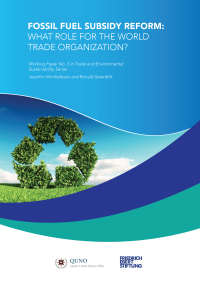Fossil Fuel Subsidy Reform: What Role for the World Trade Organization?

The removal of fossil fuel subsidies (FFS) would bring about many important and positive effects, among them helping to reduce air pollution and emissions of greenhouse gases that cause climate change and improving government’s finances. It could also reduce distortions affecting trade in not only the subsidized products, such as coal, fuel oil and natural gas, but also in goods that compete with fossil fuels, such as wind turbines and solar photovoltaic panels. This paper focuses on the role that mechanisms at the WTO could play within the context of a more integrative approach that also involves other global institutions.
The reform of FFS has begun to be seen as a trade-policy issue. At the 11th WTO Ministerial Conference (MC11), held in Buenos Aires in December 2017, Ministers from 12 WTO members signed a statement calling on the WTO to “to advance discussion in the World Trade Organization aimed at achieving ambitious and effective disciplines on inefficient FFS that encourage wasteful consumption”. A document supporting a similar initiative is likely to be submitted formally to MC12 when it meets in Geneva in December 2021 or soon thereafter. Meanwhile, FFS have been discussed in both the WTO Committee on Trade and Environment (CTE) and the Trade and Environmental Sustainability Structured Discussions (TESSD).
The purpose of this briefing paper is to provide information on FFS and their relationship with trade and trade rules that can help inform their discussions on possible action at the WTO, in particular in the TESSD.

